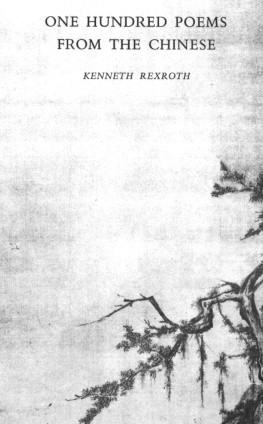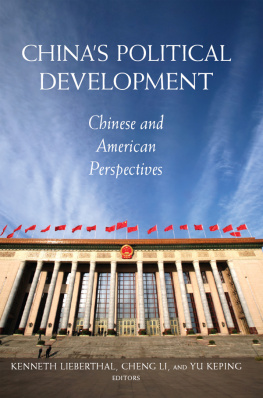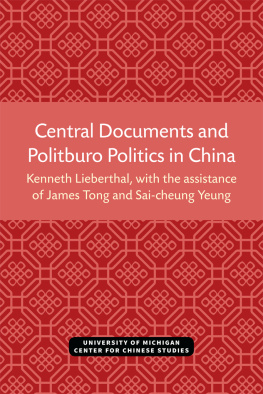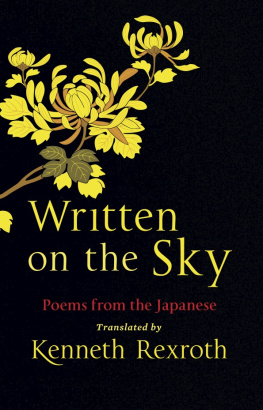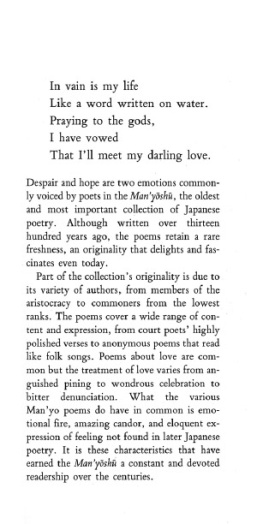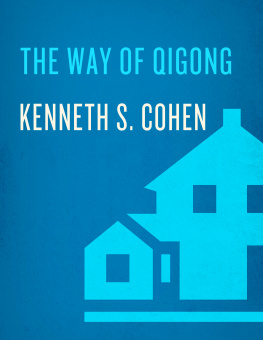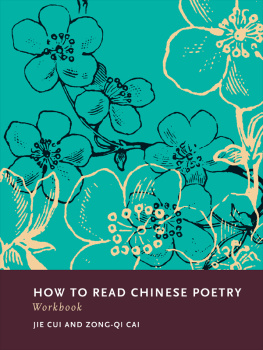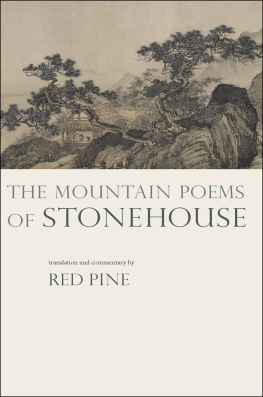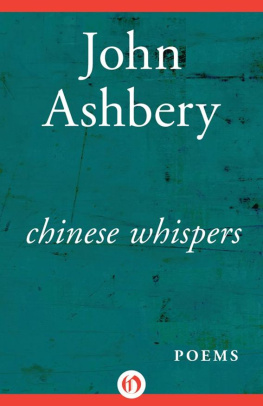Kenneth Rexroth - One Hundred Poems From the Chinese
Here you can read online Kenneth Rexroth - One Hundred Poems From the Chinese full text of the book (entire story) in english for free. Download pdf and epub, get meaning, cover and reviews about this ebook. year: 2014, publisher: New Directions Publishing, genre: Detective and thriller. Description of the work, (preface) as well as reviews are available. Best literature library LitArk.com created for fans of good reading and offers a wide selection of genres:
Romance novel
Science fiction
Adventure
Detective
Science
History
Home and family
Prose
Art
Politics
Computer
Non-fiction
Religion
Business
Children
Humor
Choose a favorite category and find really read worthwhile books. Enjoy immersion in the world of imagination, feel the emotions of the characters or learn something new for yourself, make an fascinating discovery.
- Book:One Hundred Poems From the Chinese
- Author:
- Publisher:New Directions Publishing
- Genre:
- Year:2014
- Rating:3 / 5
- Favourites:Add to favourites
- Your mark:
- 60
- 1
- 2
- 3
- 4
- 5
One Hundred Poems From the Chinese: summary, description and annotation
We offer to read an annotation, description, summary or preface (depends on what the author of the book "One Hundred Poems From the Chinese" wrote himself). If you haven't found the necessary information about the book — write in the comments, we will try to find it.
One Hundred Poems From the Chinese — read online for free the complete book (whole text) full work
Below is the text of the book, divided by pages. System saving the place of the last page read, allows you to conveniently read the book "One Hundred Poems From the Chinese" online for free, without having to search again every time where you left off. Put a bookmark, and you can go to the page where you finished reading at any time.
Font size:
Interval:
Bookmark:
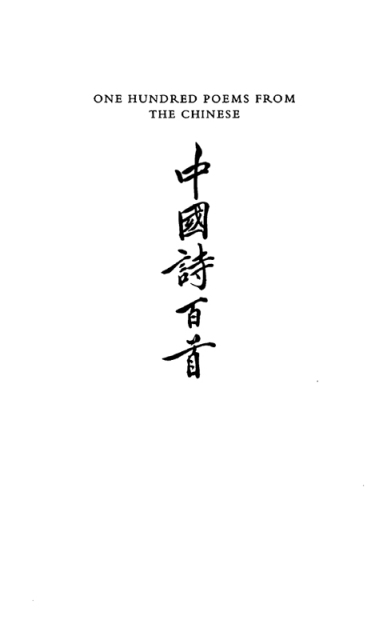

However, these translations are my own. In some cases they are very free, in others as exact as possible, depending on how I felt in relation to the particular poem at the time. The freer ones are usually those done long ago. I have had the work of Tu Fu by me since adolescence and over the years have come to know these poems better than most of my own. The second part is a selection of poetry of the Sung Dynasty, most of it never in English before. Margoulis. Margoulis.
Both of these translations have considerable merit as poetry in their own right. Later I took my translations to the originals and changed them around to suit myself. Again, what has resulted is my own responsibility, sometimes more literal, more often freer, than the Tu Fu renderings. I hope in all cases they are true to the spirit of the originals, and valid English poems. I might say that Sung poetry, so much less compact than that of Tang, Tu Fus period, permits more liberties. There is no special reason for this procedureI just happened to have a number of European versions of Sung poetry and a few texts at hand the last two summers in the mountains, and was able to finish up in libraries in the winter.
And, I was anxious to get a good selection of the vast mass of Sung poetry, not anthologized satisfactorily even in Chinese, into English. The whole spirit of this time in China is very congenial today, especially to the romantic, empirical-mystic and antinomian taste which has prevailed in the arts of the West since 1940. Not only does Sung poetry deserve to be better known, but it includes one of Chinas very greatest poets, Su Tung Po, and Li Ching Chao, her greatest poetess. Perhaps, someday, when I have more time to spend in the libraries of university Oriental departments, I will do 100 Poems of Sung and 100 Poems of Tu Fu. So, here are two selections of poetry, one the work of a couple of years, the other the personal distillate of a lifetime. I hope they meet the somewhat different ends I have in view.
I make no claim for the book as a piece of Oriental scholarship. Just some poems. K. R. 
The brook flows in the darkness Below the flower path. The thatched Roof is crowned with constellations. As we write the candles burn short. Our wits grow sharp as swords while The wine goes round. When the poem Contest is ended, someone Sings a song of the South. And I think of my little boat, And long to be on my way.
TU FU
You want nothing, although at night You can see the aura of gold And silver ore all around you. You have learned to be gentle As the mountain deer you have tamed. The way back forgotten, hidden Away, I become like you, An empty boat, floating, adrift. TU FU
The birds in the eaves are restless, Because of the noise and light. Soon now In the winter dawn I will face My fortieth year. Borne headlong Towards the long shadows of sunset By the headstrong, stubborn moments, Life whirls past like drunken wildfire. TU FU
Snow skurries In the coiling wind. The wineglass Is spilled. The bottle is empty. The fire has gone out in the stove. Everywhere men speak in whispers. I brood on the uselessness of letters.
TU FU
The Northern Crown crosses the sky Cut by the temple roof, Where an iron phoenix soars and twists in the air. The chanting of prayers floats from the hall. Fading bell notes eddy by my bed. Tomorrow in the sunlight I shall walk in the manured fields, And weep for the yellow dust of the dead. TU FU
The moon toad swims in the river And does not drown. The moon rabbit Pounds the bitter herbs of the Elixir of eternal life. His drug only makes my heart More bitter. The silver brilliance Only makes my hair more white. I know that the country is Overrun with war. The moonlight Means nothing to the soldiers Camped in the western deserts.
TU FU
The storm Scatters the red autumn leaves. His dancing girls are yellow dust. Their painted cheeks have crumbled Away. His gold chariots And courtiers are gone. Only A stone horse is left of his Glory. I sit on the grass and Start a poem, but the pathos of It overcomes me.
The future Slips imperceptibly away. Who can say what the years will bring? TU FU
Twittering birds fly past to roost. Twinkling stars move over ten Thousand households. The full moon Enters the Ninth Constellation. Wakeful, I hear the rattle Of gold keys in locks. I hear jade Bridle pendants tinkling in The wind. At the dawn audience I must present a special Memorial.
Time and again I wonder how long the night will last. TU FU
Font size:
Interval:
Bookmark:
Similar books «One Hundred Poems From the Chinese»
Look at similar books to One Hundred Poems From the Chinese. We have selected literature similar in name and meaning in the hope of providing readers with more options to find new, interesting, not yet read works.
Discussion, reviews of the book One Hundred Poems From the Chinese and just readers' own opinions. Leave your comments, write what you think about the work, its meaning or the main characters. Specify what exactly you liked and what you didn't like, and why you think so.

